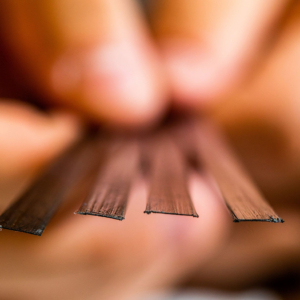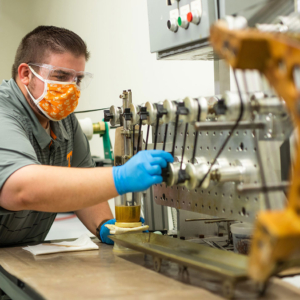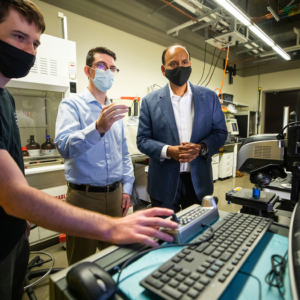UT Researcher Dayakar Penumadu is refining the materials of the future.
In 2001, UT made an offer to Dayakar Penumadu to move his materials research and teaching to what he calls the “innovation ecosystem” created by the partnership between Oak Ridge National Laboratory and UT—a research university committed to being a national leader in the field of advanced materials.
On his visit to campus, Penumadu discovered another inspiring ecosystem. “I still remember the first time I visited UT,” he said. “I just fell in love with the beauty here, the environment of the Tennessee River and the mountains. Having such an advanced learning environment in the middle of this nature is just such a blessing.”
In his two decades in Knoxville, Penumadu—now the Fred M. Peebles Professor in UT’s Tickle College of Engineering and, in a joint role with ORNL, the Joint Institute for Advanced Materials Chair of Excellence—says he has experienced the best of both worlds.
Penumadu is part of a research community made up of 150 faculty members across the university who are working across disciplines to break ground in an increasingly important field. He and his team are conducting research that leverages the resources of ORNL’s Carbon Fiber Technology Facility, the only US Department of Energy facility designated for carbon fiber innovation, to develop next-generation fiber-reinforced composite materials that are lower in cost, lighter, and more durable than current options.
The advanced carbon, glass, and basalt fibers used in these projects are already being employed to make lighter, stronger structures, vehicles, and airplanes and will eventually become more common in a wide range of applications. Penumadu and his group recently put them to work in building a lightweight and durable smart bridge in Morgan County, Tennessee, embedded with sensors that track vibration and stress. Visitors to campus can see a composite material bridge firsthand when they cross the pedestrian bridge to the Tickle Engineering Building.
Another recent success story is a collaboration with Volkswagen, one of the world’s leading automobile manufacturers and the largest carmaker in Europe.
Back gates of minivans and SUVs, called lift-gates, are made mostly of metals. Volkswagen asked Penumadu and his group to see what they could do with lightweight and durable composite materials. “In a collaborative project, we were able to demonstrate a 30 percent reduction in weight and consolidate the number of parts from more than 10 they currently use with metallic parts to just two using composite parts,” said Penumadu.
The combination of the unique manufacturing resources of a national lab and the intellectual diversity of UT is a successful one, he finds.
“That gave a starting point for Volkswagen to realize we are really special in that we are not just academic types, where you come up with a great idea and say, ‘Let somebody else figure out how to make it work.’ Instead, we took the ideas, we worked with them, and we came up with prototypes which they could communicate with their German counterparts.
“It generated the level of confidence in our ability to work with industry, which is a strength for UT. I’m not surprised that it played an important role in Volkswagen deciding to pursue the innovation hub here in Knoxville.”
Volkswagen is also a member of the Institute for Advanced Composites Manufacturing Innovation (IACMI)—a research and innovation consortium funded by the US Department of Energy. Penumadu helped create the UT–ORNL proposal that beat out 30 others from around the nation to form the institute, which is currently headquartered at ORNL Manufacturing Demonstration Facility. Plans are in place to integrate it into UT’s Research Park at Cherokee Farms.
A partnership of industry, academic institutions, and federal, state, and local governments, IACMI is driving domestic production capacity, strengthening US manufacturing competitiveness, and elevating job creation across the composites industry. Its presence at UT is also a boon for Penumadu’s students.
“Dr. Penumadu recognizes the growing composites field and wants to make sure his students graduate with the skills to not only enter the field but also continue to advance it,” said Hannah Maeser, a PhD candidate from Huntsville, Alabama, who works with carbon fibers.
Penumadu values his role in nurturing the future leaders of advanced manufacturing. “To me, the most important job as a faculty member is to inspire young minds to reach the potential they’re fully capable of. I emphasize that 99.99 percent of success is hard work.”
The value of that hard work came to life for Penumadu when he heard a speech by former UT football player Inky Johnson. He was inspired to establish the Inky Johnson Perseverance Scholarship to financially support ambitious students who are overcoming life hurdles during their time at UT, helping to ensure they can stay at the university and persevere.
Penumadu’s dedication to advancing the field—through both his research and his support of the students who will go on to develop their own innovations—is at the core of everything he does.
He sees our national infrastructure of interstate highways, power grids, and internet connectivity as the key to economic prosperity. “All these are dependent primarily on materials,” he says.
“In civil engineering, we talk about structural materials. In mechanical engineering, we talk about automotive materials. In electrical engineering, we talk about electronic materials. The unifying theme is that we are creating materials to enable this infrastructure to work efficiently.
“When we are challenged by disasters like hurricanes and when the infrastructure is not working, we see how it can really impact life. So I take pride in saying that materials are an important piece of the puzzle. As one of our past mentors, Professor Ward Plummer, former director of UT’s materials labs, used to say, whoever controls materials will control the future.”





